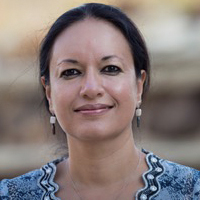People around the world find themselves in the midst of one great, shared experience. Social distancing and large-scalquarantine measures became the norm in the months of March and April for many in the U.S. Colleges and schools stand empty, workplace conversations take place on laptops around kitchen tables or, in many industries, not at all. We spoke with a few of our members whose lives, work and studies have been directly impacted since governments across the U.S. took measures to slow COVID-19’s spread.
Dr. Nyla Ali Khan is a professor at Rose State College, Midwest City, Oklahoma and taught as a Visiting Professor at the University of Oklahoma. Formerly, she was a professor at the University of Nebraska-Kearney. She received her Ph.D. in English Literature and her Masters in Postcolonial Literature and Theory at the University of Oklahoma. Author of several published articles, book reviews and editorials, she has edited Parchment of Kashmir, a collection of essays on Jammu and Kashmir, written four books, including The Fiction of Nationality in an Era of Transnationalism and Islam, Women, and Violence in Kashmir: Between Indian and Pakistan.
How did the COVID-19 issue impact your day-to-day work?
“The transition to the virtual world has not been a cakewalk for everyone. Several people, particularly of my parents’ generation, are not technology friendly but are now having to adapt to talking with friends and family via Skype or Zoom.
“I have several students who are trying to make ends meet in the midst of this unforeseen crisis. Some of them are now working two jobs, so they can pay their bills.
“Others are working hard to support those of their family members who have been furloughed. There are some who don’t have Wifi access or erratic internet connections, and cannot participate in Zoom meetings as efficiently as they would like to. A couple of days ago, one of my students participated in a Zoom meeting from her car, because her entire family was in the house and she couldn’t concentrate. I saw determination and perseverance in these kids. Several of them pushed themselves to meet deadlines and step up to the plate. They learned to see their challenges as opportunities to grow, and, as an academic, I am here for them.
“While the transition to online classes came with its set of challenges, my students did not throw in the towel. On the contrary, they adjusted to their new reality with a newfound confidence. In the last Zoom session with one of my classes earlier today, everyone got a little sentimental while acknowledging how much we had learned from one another. I am glad that my students and I were able to create a safe environment in which we examined our locations of privilege and sought emotional empowerment in order to understand systems that have generated a culture of silence about systemic discrimination. It has been an invaluable educational experience to hear my students make presentations on their intellectual interests in a world transformed by COVID-19.”
Have there been any positives you can point to in terms of new ways of doing business or working that have come during this time?
“In the wake of the outbreak of COVID-19, bewilderment reigns supreme. Self-imposed isolation is the new social order. People are experiencing a loneliness epidemic because of social distancing. Compassion is rarely expressed, because everyone is looking out for her/himself. I have realized that we need a global response not just to COVID-19 but to humanitarian disasters that have followed in its wake. A lot of us focus on big achievements, forgetting that the small moments count as much as the big ones.
“When it comes to my students, I want to be present not just for the big moments, but for the small ones as well. There is potential for meaning in every moment. COVID-19 compels me to rethink perceptions that some of us thought were unquestionable and self-axiomatic.
“During this period, my students and I built bridges and worked with sincerity. We cannot afford to hamper progressive political and social change. We realized more than ever that we cannot afford to section off humanity into various “races” and various “worlds,” because that robs us of our power to prevent disease from destroying the world. In spite of the physical delineation of the boundaries, we all live in one zone. Our hopes, aspirations, fears, and dangers are the same.
“During this period, my students and I realized more than ever that we are all connected by the common bond of humanity, and that we can take control by holding up with dignity and resilience when adversity knocks on our doors.”
In terms of your international activities, how have those been impacted by the past three months?
“All of us are trying to adjust to the unforeseen changes brought about by the onset of COVID-19. Although traveling to other parts of the world has been incredibly difficult, my life has not been devoid of meaning.
“I have continued to write for international periodicals/ publications, and my work on issues of global import has been appearing in print as well as online editions of those publications. I was also interviewed by the Institute of Peace and Diplomatic Studies, Pakistan, which has recently launched a digital live show, “Global Women Insight,” to talk with “inspiring women leaders about their lives, struggles, and leadership.” My interview was watched by an audience comprising people from various parts of the world, particularly South Asia.”






